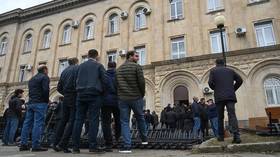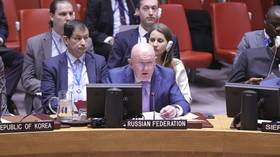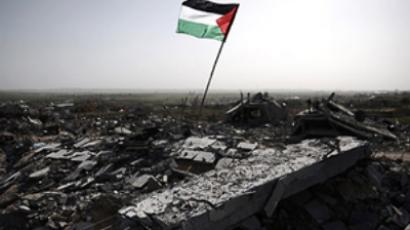Israel under pressure over 1,000 to 1 prisoner exchange with Palestine
Since Hamas captured Israeli soldier Gilad Shalit back in 2006, his plight has been etched into the nation's conscience. Israelis have pressured the government to offer thousands of Palestinians in exchange for Shalit.
And, as Palestinians stage protests for “National Prisoner Day,” demand for the swap is increasing at home.
Palestinian Deputy Minister for Prisoner Affairs Ziad Abu Ein has been in and out of Israeli prisons for more than 30 years. As a result, he is cynical about any proposed prisoner exchange between the sides.
He was supposed to be part of an Israeli-Palestinian deal in 1983, but said the Israelis tricked the Red Cross and sent someone else in his place.
Still, he is hoping that his lifelong friend Marwan Barghouti will be freed in a future exchange that would see Shalit come home.
“We were hiding – me and Marwan – in several places. In April 15 he came to this house and they came after him… In just a little time they were surrounding the whole house, coming with their tanks, military guards. There were helicopters and hundreds of soldiers surrounding my house,” Abu Ein said.
Barghouti heads the Palestinian prisoner list, as he is a controversial choice in Israel, where he is serving five life sentences for killing Israelis.
The Israeli army has arrested some 1,000 Palestinians who are now in Israeli jails. Thousands more have passed through the system. Most have been found guilty of terrorist activities by Israeli courts, although a significant number are still awaiting trial.
An equal exchange?
Today, Fayed Abu Al Hajj heads the Abu Jihad Center for Political Prisoner Affairs. He was 16 years old the first time he was arrested. He spent the next 15 years behind bars. And like many former prisoners, he supports the deal on the table: 1,000 Palestinian prisoners for one Israeli soldier.
“Israelis say it should be one prisoner for one prisoner, but if this criterion was used, we would have to capture 1,000 Israeli soldiers in order to exchange 1,000 Palestinian prisoners. It is not reasonable. Shalit is a soldier and he was caught in uniform. We are a people under occupation and it is our right to resist the occupation,” Al Hajj said.
Shalit has been in the hands of Hamas since June 2006. Many believe that if Hamas were ever to release him, it would be to gain political brownie points.
The potential release will also make a huge difference to Shalit’s family, who has had no contact with him since he was captured. Despite the risks, they say a deal must be cut.
“Basically Israel, when releasing terrorists that have committed terror actions in the past, has to take care that they will not go back to do these actions, and we have the confidence to do this,” said Gilad’s father Noam Shalit.
Most Israelis want a deal to go ahead, although a growing number feel the price is too high.
And the Israeli government wants to save face with its own population, fully aware, however, that the release of thousands of prisoners may encourage more kidnappings further down the line.














